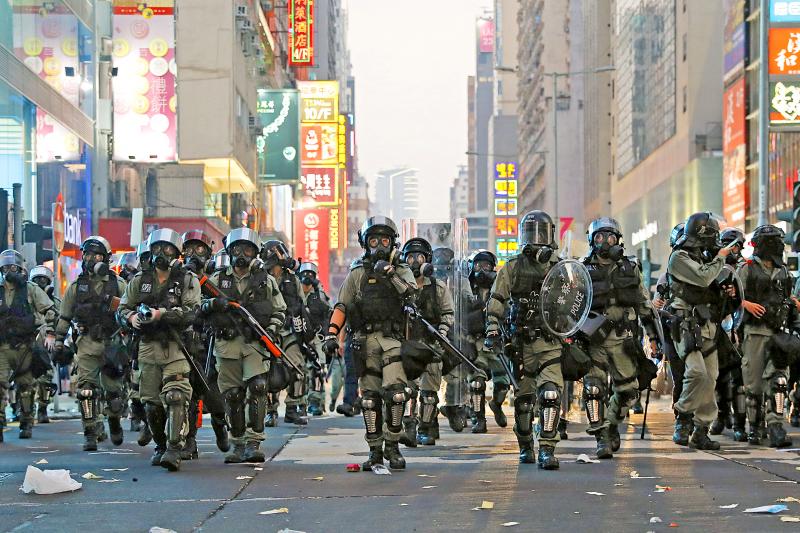China’s top legislative body yesterday released new details of national security legislation to be imposed on Hong Kong, shedding light on a measure that pro-democracy groups warn could undermine the territory’s appeal as a financial center.
The draft bill calls for Hong Kong to establish a new committee headed by its chief executive to protect national security, which would be supervised and accountable to Beijing.
China would also establish a new bureau in Hong Kong to analyze the security situation, collect intelligence and “lawfully handle national security cases,” according to draft language released by the official Xinhua news agency.

Photo: AP
The law says the central government would have jurisdiction over an “extremely small” number of national security cases under “specific circumstances,” Xinhua said.
The police and judiciary would need to establish new departments to handle cases under the law, it said.
According to the security law, the Hong Kong chief executive would appoint judges to handle criminal cases endangering national security.
The draft also asks the Hong Kong government to increase efforts to safeguard national security and prevent “terrorism.”
Hong Kong must “adopt special measures strengthening oversight and management” of schools and social organizations, it says.
The national security commission would also set up a position of special adviser, who would be designated by the central government, and provide consultation to the special commission.
Hong Kong should “respect and protect human rights,” while ensuring national security, and anyone accused has the right to defend themselves, the bill says.
The Chinese National People’s Congress (NPC) Standing Committee has the power to interpret the law, which would override any local laws that are inconsistent with its provisions.
Details of the measures to punish acts of secession, subversion, terrorism and collusion with foreign forces in the former British colony had been secret since the NPC approved their drafting on May 28.
The NPC Standing Committee began deliberations on the legislation on Thursday, after a last-minute announcement that it had been added to the agenda.
The law would shape the future of Hong Kong, raising questions about the autonomy of a territory whose global status is a underpinned by its legal distinction from the mainland.
Chinese President Xi Jinping’s (習近平) government decided to bypass the elected Hong Kong Legislative Council and impose the security law after a wave of historically large and sometimes violent protests gripped the territory last year.
The law has fueled resurgent pro-democracy protests and led the US to threaten to revoke Hong Kong’s special trade status, which has helped maintain its role as a vital financial crossroads between China and the West.
The European Parliament on Friday voted in favor of taking China to the International Court of Justice in The Hague if Beijing imposes the security law on Hong Kong.
Hong Kong Lawmaker Fernando Cheung (張超雄) said the details made clear that the Chinese Communist Party “has the power to pick whoever they want” and bring them to the mainland to face criminal charges.
“No doubt, this law has immediately turned Hong Kong into a mainland city,” he said. “I don’t see how the international community would feel secure under this law and I’m sure that there will be an exodus of young professionals in the near future.”

SECURITY: As China is ‘reshaping’ Hong Kong’s population, Taiwan must raise the eligibility threshold for applications from Hong Kongers, Chiu Chui-cheng said When Hong Kong and Macau citizens apply for residency in Taiwan, it would be under a new category that includes a “national security observation period,” Mainland Affairs Council (MAC) Minister Chiu Chui-cheng (邱垂正) said yesterday. President William Lai (賴清德) on March 13 announced 17 strategies to counter China’s aggression toward Taiwan, including incorporating national security considerations into the review process for residency applications from Hong Kong and Macau citizens. The situation in Hong Kong is constantly changing, Chiu said to media yesterday on the sidelines of the Taipei Technology Run hosted by the Taipei Neihu Technology Park Development Association. With

CARROT AND STICK: While unrelenting in its military threats, China attracted nearly 40,000 Taiwanese to over 400 business events last year Nearly 40,000 Taiwanese last year joined industry events in China, such as conferences and trade fairs, supported by the Chinese government, a study showed yesterday, as Beijing ramps up a charm offensive toward Taipei alongside military pressure. China has long taken a carrot-and-stick approach to Taiwan, threatening it with the prospect of military action while reaching out to those it believes are amenable to Beijing’s point of view. Taiwanese security officials are wary of what they see as Beijing’s influence campaigns to sway public opinion after Taipei and Beijing gradually resumed travel links halted by the COVID-19 pandemic, but the scale of

A US Marine Corps regiment equipped with Naval Strike Missiles (NSM) is set to participate in the upcoming Balikatan 25 exercise in the Luzon Strait, marking the system’s first-ever deployment in the Philippines. US and Philippine officials have separately confirmed that the Navy Marine Expeditionary Ship Interdiction System (NMESIS) — the mobile launch platform for the Naval Strike Missile — would take part in the joint exercise. The missiles are being deployed to “a strategic first island chain chokepoint” in the waters between Taiwan proper and the Philippines, US-based Naval News reported. “The Luzon Strait and Bashi Channel represent a critical access

Pope Francis is be laid to rest on Saturday after lying in state for three days in St Peter’s Basilica, where the faithful are expected to flock to pay their respects to history’s first Latin American pontiff. The cardinals met yesterday in the Vatican’s synod hall to chart the next steps before a conclave begins to choose Francis’ successor, as condolences poured in from around the world. According to current norms, the conclave must begin between May 5 and 10. The cardinals set the funeral for Saturday at 10am in St Peter’s Square, to be celebrated by the dean of the College